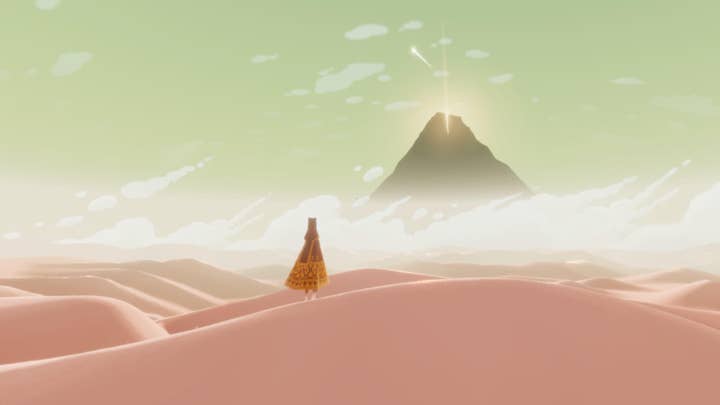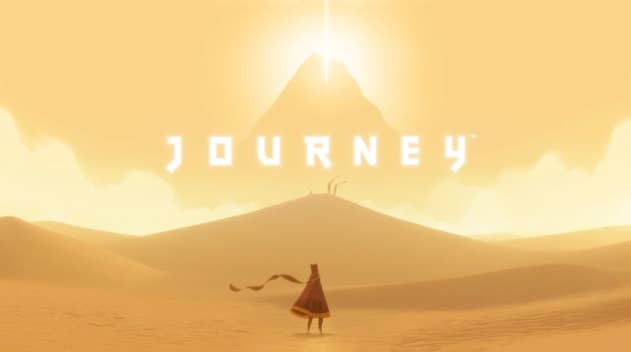Ten years later, Jenova Chen reflects on Journey
ThatGameCompany CEO discusses what the game meant to players and to himself, both personally and professionally
This weekend will mark the tenth anniversary of ThatGameCompany releasing Journey on the PlayStation 3.
A sombre and wordless adventure through a desolate environment, Journey was a rare offering at the time, an independently developed game with clear artistic aspirations given a prominent spotlight from a major platform holder in Sony.
Players' goals were communicated simply, a beckoning mountain in the distance with a beam of light emanating from within a rupture at the peak, a path of plant-like constructs that recharge the player's limited flying ability creating a path to who knows where.
The story was likewise less explicit than players were used to, with hieroglyphic-like cutscenes sketching out the demise of a lost civilization. The player character was similarly a rough sketch of personhood, a robed entity with pointy, angular legs, no arms, no discernable gender, and no facial detail beyond its eyes.
Even the game's approach to multiplayer did its best to spell out as little as possible, pairing players together without the usual indicators of online play and minimizing their communications. There was a button they could use to make their character chirp, useful for calling attention to an area or letting players know where each other is, but that was about it. There were no user names (until the end credits), no matchmaking lobbies, and no chat functionality, voice or text.

The game was a critical and commercial success, eventually garnering Game of the Year awards at the Game Developers Choice Awards and DICE Awards, as well as from numerous media outlets including IGN and GameSpot.
To mark the anniversary of Journey's release, TGC co-founder and CEO Jenova Chen speaks with GamesIndustry.biz about his takeaways from the game with a decade's worth of hindsight.
Fostering stories
"We were never expecting to see such a positive response when we were making the game," Chen says. "When the game released back in 2012, we started to see a flood of letters and emails, players sharing their stories with us of what the game has meant to them."
While some of the stories he heard from players were singularly remarkable -- one who fell in a frozen lake as a child and was clinically dead for almost two minutes said the game was a closer description of what that felt like than he had ever been able to describe -- Chen was struck by one particular kind of story he had heard dozens of times.
In each of those stories, the players told Chen that they had lost a loved one shortly before playing the game, and became convinced that their silent partner through the game was actually their loved one having come to say goodbye.
"When they played through the game together, it helped them to grieve," Chen says. "It helped them to let it go, knowing their loved one was going to a better place. I never thought the game would have the power to be essentially therapeutic, to help people, but it's changed many people's lives, and that's the biggest surprise to me."
"Exposing the other player's PSN ID with an inappropriate alias could kill the mood immediately... We had to work with Sony to figure out a way to block those names until the end of the game"
Those stories were facilitated by the design choices that went into Journey's multiplayer.
"Exposing the other player's PSN ID with an inappropriate alias could kill the mood immediately," Chen says. "Just hiding the player's PSN ID is not enough because we noticed that the PlayStation cross media bar offers a feature where you can see the name of the recently interacted player aliases. We had to work with Sony to figure out a way to block those names until the end of the game."
User names weren't the only standard of the time TGC ignored.
"We also removed the gender and age identity in the way the avatar is designed," Chen says. "We also removed the arms of our players, so they can't punch and push each other for fun and to be rude. We removed the personal possession so players don't stay away from each other to avoid stealing and competing over resources, etc."
And while Chen says it wasn't something he understood as clearly at the time, he's since become more mindful of how the context developers give players shapes their behavior.
"A lot of people have a very negative connotation about players online being mean and aggressive, particularly over voice chat," Chen says. "And I think by now it's very clear that it's not the people who are mean. It's the environment that brings out the mean behavior. The same people who were teabagging each other in a shootout in Call of Duty would be playing Journey the next minute. And those same folks, the teenage console players, would come to our forums and leave posts saying, 'To whoever was with me, I'm sorry that I had to go without being a companion with you to the end because my mom really needed me to go. But I hope you can see this post that it was a wonderful experience.' These people writing apologies to someone they don't even know, they're the same folks.
"Ultimately, we human beings are capable of being gentle and compassionate only when we're in an environment where we're capable of compassion"
"Ultimately, we human beings are capable of being gentle and compassionate only when we're in an environment where we're capable of compassion. When you put a person onto a battlefield and give them a gun, their first thing is to think, 'How am I going to protect myself from being killed?' Or 'Am I going to be able to use this gun to kill someone else?' Imagine if you give someone a first aid kit [instead]. It changes their mode of thinking and behavior."
For Journey, Chen says the key to creating a healthier environment for player interactions was to make them feel a sense of awe.
"Essentially, that makes them feel small and vulnerable, and we believe that sense of vulnerability allows people to open up and connect with each other," Chen says. "Because when you realize how small and fragile your life is, you can easily relate to a fellow human being and how their life is fragile and small. So you're more likely to think about how you can help this person, or how the two of you can stay stronger together.
"But most video games are focusing on simulating competitions, and it's a power fantasy for boys who don't have many freedoms. When you give them too much power, they're thinking, 'Who has the stronger power?' I'm Superman, you're Batman, who's the stronger one here? But if we're both refugees in a war, we wouldn't be thinking about fighting it out to see who's stronger; we'd be thinking about how we can survive."

The decision to limit multiplayer to two people also stemmed from that same approach. Early on in the game's development, Chen says they tried to design the game around three or four players, but quickly found situations regularly devolved into having an "us" and "them" mentality where part of the group would want to do one thing while a single person wanted to do something else and would be left out or left behind, a disappointing experience they found ran counter to the emotional reaction they were hoping to spark with the game.
Chen says TGC's current game, the Journey spiritual successor Sky: Children of Light, was an attempt to tackle both of the above issues, and he's pleased with the results so far.
"Deep down I was always curious if I could tackle this problem with a bigger crowd," he says. "Can I still create emotional bonding with more than two people? So Sky is our challenge to the next step. If you could actually chat and you had more than two people, can you still protect the community and create an environment where people show the brighter side of their humanity rather than what we consider the darker side?"
Personal impact
Journey -- and the reaction to it -- changed Chen's life as well.
"Personally, it made me feel very lucky," he says. "We always think of struggling artists. Artists tend to be loners and weirdos growing up. They tend to think outside the box, and are the minority. It's a lonely kind of life.
"I feel loved. I feel not alone. And that's a wonderful experience"
"But art connects the artist with the audience. Knowing that something you put your life into -- something you cared about, dreamed about, something you thought about every single day -- was able to reach to a lot of people and they heard your voice and appreciated your children... loving your children is like an extension of me loving you. And I feel loved. I feel not alone. And that's a wonderful experience. This feeling of gratitude is also what gives me the inspiration to make future games."
It's a nice payoff considering Journey had a difficult development cycle that dragged on longer than initially planned.
"What is happening in the artists' mind and life will influence the game," Chen says. "Journey was a very difficult to make game. And the struggle we had during development also reflects in the game's final struggle level. It's a mirror of the people who worked behind it."
Unfortunately, a significant portion of those people were gone from TGC before they were able to enjoy the results of their work. At the point of the game's release, the studio had been running on fumes, with Chen saying it was $200,000 in debt.
"We couldn't afford anybody's salaries," he says. "We had a celebration. We took a retreat in the mountains, celebrated, and then we disbanded the company, so everybody had to find new jobs."
The crisis was brief -- Chen says it took up to six months for TGC to start getting its portion of sales from Sony and the studio also raised several million in funding three months after launch -- but long enough that a chunk of key talent left the studio. Chen notes that a number of those who left returned for second stints with the company.

Beyond changing the roster of creators at the studio, Journey also changed the company's remit to some extent. Journey was the exclamation point on a three-game partnership between TGC and Sony -- Flow and Flower were the first two titles -- and even though those games were tremendously well received, they also emphasized for Chen that a console platform holder like Sony was not an ideal partner for his goals.
"TGC's games are meant to be played by a much broader range of players due to its emotional accessibility. And I felt the destiny of TGC is to make games for everyone rather than hardcore console players"
"What really dawned on me was that TGC's games are meant to be played by a much broader range of players due to its emotional accessibility," Chen says. "And I felt the destiny of TGC is to make games for everyone rather than hardcore console players. And we decided to help TGC reach its destiny, our next game needs to be on platforms where everyone has access to hence cross platform between mobile, console and PC. We started with mobile since it was the most difficult platform to develop on. The rest is history."
The company's fortunes have improved considerably since the time of Journey's launch, but Chen seems equally proud of the impact the game had beyond his studio.
"I think it's a good thing for the industry because a lot more people started to consider making their own narrative games that had strong emotional impact," he says. "I think that's really what the industry was lacking at the time. We're not short on amazing combat, driving, and sports simulations. We were lacking on the more emotional, nuanced, artistic side."
The gaming audience has been growing older, he says, and it's only natural their tastes in entertainment have been changing as well.
"Right after Journey, in the past decade we've seen so many powerful, emotional narrative pieces coming out of the industry from both indie and AAA [developers]," he says. "That's a real big change, and I think more people now are looking into the possibility to use gameplay as the main narrative drivers for emotion. There was a time when emotional story only happened in the cutscenes, but nowadays, a lot of the games make you cry even when you're playing. That to me is a great advancement in the industry. "
The Great Dilution
Despite that advancement, Chen is clearly still sensitive to how the rest of the world views the games industry. In announcing a $160 million investment round last week, TGC's press release included a quote from Chen saying, "Our mission is to elevate games as a legitimate form of art... Animated feature films have had genre-defining moments with Snow White and Toy Story, and we will continue working toward this moment in the gaming world."
When we ask about whether that question of games as art hasn't been settled long ago, Chen says things have changed considerably over the decades, and games are already seen as art by the people who grew up playing games.
"Video games are farther away from being respected as an art form by the mainstream"
"On the other hand, video games are farther away from being respected as an art form by the mainstream," he says. "From 2014 until now, is what I call the 'Great Dilution' for the game industry. Thanks to the social and mobile game expansion, we see a 10x growth in the total population of people who have access to gaming content. But the majority of the new games came out on mobile and social platforms focused on pure growth rather than respect. While more high quality artistic games are made year after year, this dilution drastically shifted the public impression on the gaming industry.
"I judge whether video games are a respectful artistic medium by watching people's response after I tell them 'I make video games.' I expect when video games are indeed legitimate art, the reaction wouldn't stray too far from what you would get if you are a writer, choreographer, architect or filmmaker.
"In 2005, people told me 'Oh you guys ruined our kids by making them addicted and violent.' Today, mainstream society still views games as mostly serving the role of babysitters, a stress relief or an addiction. [Terms like] 'Spiritual Opium' and 'Virtual Gambling' were used by various governments last year. When I told someone outside gaming I make video games recently, he responded 'Oh, I heard gaming is big money. How much money do you make? How many overtimes do you have to work?'"
Even if there's still a ways to go when it comes to mainstream understanding and acceptance of games, Chen is clearly glad for the progress that has been made, and for the role Journey may have helped play in that.
"After ten years, I feel very grateful for what happened," Chen says. "It's also strange because we're growing the company and I interview people and they tell me, 'I played Journey when I was 13 years old!'
"It makes me feel old, but at the same time it's rewarding that this is a game that changed people's perspectives."

